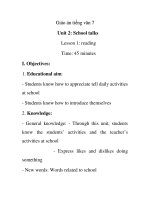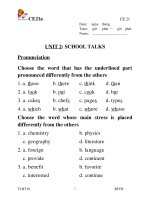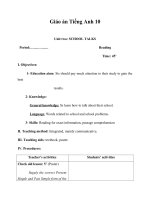UNIT 2 SCHOOL TALKS Tests Keys
Bạn đang xem bản rút gọn của tài liệu. Xem và tải ngay bản đầy đủ của tài liệu tại đây (131.22 KB, 7 trang )
UNIT TWO ~ SCHOOL TALKS
I. MULTIPLE CHOICE
1. She......walking into the office and handing in her resignation.
A. imagined
B. thought
C. dreamed
D. supposed
2. The woodwork has recently been given afresh......of paint.
A. shirt
B. blouse
C. coat
D. lay
3. ......the shed with weather-resistant paint.
A. Do
B. Make
C. Put
D. Paint
4. The winning team was......by cheering crowds.
A. shouted
B. greeted
C. said
D. told
5. We have all been in similar embarrassing.......
A. situations
B. environment
C. places
D. position
6. He......bitterly that he had been unfairly treated.
A. shouted
B. complained
C. groaned
D. mourned
7. We are employing an assistant to help with the.......of the group's activities.
A. announce
B. declaration
C. advertisement
D. launching
8. He's on the......of directors.
A. board
B. pannel
C. group
D. line
9. He pointed......the dangers of driving alone.
A. in
B. at
C. out
D. into
10. There are no significant......between the education systems of the two countries.
A. differences
B. differ
C. differentiate
D. different
11. I used to.......T.V more often than I do now.
A. watching
B. watch
C. watched
D. to watching
12. Nowadays parents make their children.......too hard.
A. working
B. work
C. worked
D. to working
13. Will you be able to come to my party.......Tuesday 4th July?
A. at
B. on
C. in
D. during
14. I sometimes help my parents........housework.
A. make
B. in making
C. do
D. in doing
15.1 hope they'll concentrate........their computer skills.
A. to improve
B. improving
C. on improving
D. on improve
16. The girl denied........the news.
A. tell
B. told
C. to tell
D. telling
17. I can't bear people........at me.
A. shout
B. shouting
C. shouted
D. to shout
18. You can go......,. you like. This isn't private land.
A. nowhere
B. anywhere
C. somewhere
D. there
19. Is this the place........your mother was born?
A. where
B. which
C. that
D. what
20. How........information did you ask for?
A. many
B. much
C. a lot
D. some
21. Could I have......sugar in my coffee, please?
A. any
B. some
C. a few
D. few
22. Would you like......your holiday with my family in Brazil?
A. spend
B. to spend
C. spending
D. spent
23. My father's very keen......classical music.
A. to liten
B. to listen to
C. on listening to
D. on listening
24. I remember......next door to you when we were in Australia.
A. to live
B. living
C. live
D. have lived
25. It's the best book......I've ever read.
A. which
B. what
C. who
D. that
26. 1 study in class 10 with forty-five......students.
A. other
B. another
C. others
D. anothers
27. I study many......such as Mathematics, Literature and Physics.
A. things
B. subjects
C. branches
D. languages
28. I like English best because it's an important......of international communication.
A. means
B. way
C. access
D. manner
29. I've been learning English for four years now,......I can speak the language quite well.
A. although
B. so
C. because
D. however
30. Most of the teachers in my school are kind......students.
A. with
B. at
C. about
D. to
II. There is at least one mistake in each sentence. Correct all the mistakes you can find.
1. We all know that the band is in tour in France so all we can do is wait. ........
2. His quality of life improved dramatically since the operation.
........
3. We expect to see furtherly improvement over the coming year.
........
4. Don't take any notice about what you read in the papers.
........
5. Nothing satisfies him - he's always complainting.
........
6. She has all the quality of a good teacher.
........
7. Soldiers were matching up and down outside the government buildings. ........
8. The university will come its target of 5000 students next September.
........
9. Children must learn socially acceptably behaviour.
........
10. Please confirmation your acceptance of this offer in writing.
........
III. Supply the correct form of the word in bold.
1. Local......are listed in the newspaper.
ENTERTAIN
2. Larger manufacturers have been encouraged to......their operations.
INTERNATION
3. I don't find him very........
COMMUNICATE
4. Many of the performers were very.......
PROFESSION
5. Fishing is his favourite.......
RELAX
6. He greeted all the guests......as they arrived.
WARM
7. They exchanged......and sat down to lunch.
GREET
8. You could get into a......where you have to decide immediately.
SITUATE
IV. Fill each gap with a suitable word from the below.
communicative
biology
international imagine
crowded
entertaining
geographical common
relaxed
paint
1. They are studying the......of marine animals.
2. Barbecues are a favourite way of......friends.
3. He is a pianist with an......reputation
4. The importance of the town is due to its......location.
5. Nowadays students need to develop their......skills.
6. We have a very......schedule.
7. Jackson is a......English name.
8. I take a fairly......attitude towards what the kids wear to school.
9. I can't......life without the children now.
10. The......is starting to peel off.
V. Find a suitable word for the sentences below. One example has been done for you.
0. A. Are you interested in geography lessons?
B. She's got a degree in geography
C. Kim knew the geography of the building and strode along the corridor.
1. A. We are in regular......by letter.
B. Doctors do not always have good......skills.
C. Snow has prevented......with the outside world for three days.
2. A. He was an electrician by.......
B. She was at the very top of her.......
C. The legal......has / have always resisted change. ·
3. A. There's always a lot of......at this time of day.
B. They were stuck in......and missed their flight.
C. We got used to the constant noise of the.......
4. A. The noise is.....her.
B. Don't keep.....him with a lot of silly questions.
C. What keeps.....me is how I am going to get another job.
5. A. She isn't that.......of girl.
B. The regions differ in size, but not in......
C. I need to buy paper and pencils, that.....of thing.
6. A. Is there any.....of contacting him?
B. Have you any.....of identification?
C. We needed to get to London but we had no.....of transport.
7. A. Jeans are not.....for a formal party.
B. The book was written in a style.....to the age of the children.
C. Is now an.....time to make a speech?
8. A. The boat was.....out to sea.
B. Can you forecast where the economy is.....?
C. Where are we.....?
9. A. Breast cancer is the most.....form of cancer among women in this country.
B. Some kinds of birds which were once a.....sight are now becoming rare.
C. Allergies to milk are quite.....in childhood.
10 A. I'll only.....v/hen I know you're safe.
B......! Everything will be OK.
C. Just.....and enjoy the movie.
VI. Look at the situation and ask a suitable question in each case.
1. You want to know the name of a novel your neighbour is reading.
2. Someone has just come into your room, picked up your bag and run away. You want to know why they did that.
3. You are in your friend's house. You don't know how to switch on the air conditioner. Ask your friend.
4. You've found a gold ring in the school library. You want to give it back to its owner, but you don't know whose
it is.
5. You really like your friend's jeans and you want to buy a pair exactly like them. Ask your friend the price.
6. You want to know where your parents are going on holiday this summer.
7. You met a Cambodian girl who speaks English very well. Ask her how long she has studied English.
8. Your friends all went to a birthday party last Sunday but you were ill in bed so you couldn't go.
Ask one of your friends the names of the people who were there.
9. You are surprised your friend has got a new bicycle. Ask her/ him when she/ he bought it.
10. Your teacher has corrected your homework exercise, but you don't understand the mistakes.
Ask why the exercise is wrong.
VII. Supply the correct preposition (if any) and the -ING form (Gerund) of the i verbs in brackets.
0. Ann is fond ...........(dance)
Ann is fond of dancing.
1. Thank you.................(help) me.
2. My sister is good.................(play) tennis.
3. He needs to practise.................(speak) English more.
4. We are looking forward.................(see) you.
5. She is afraid.................(cross) the street.
6. She is not interested.................(learn) to speak French.
7. John insisted................. (buy) a new bicycle.
8. We are thinking .................(study) French.
9. 1 have no objection.................(carry) out the plan.
10.1 don't think he's accustomed.................(drive) on the right.
VIII. Read the following conversation and then make suitable changes to it.
A: Do you enjoy (1. work)......in the factory?
B: Yes, I do, although I sometimes don't like (2. work)......at night.
A: Don't you mind (3. travel)......such a long way to work?
B: No, it only takes me half an hour or so (4. get)......to the factory. Sometimes I manage (5. sleep)......on the bus.
A: Don't the noise and people on the bus prevent you from (6. sleep)
B: Not really. I can also read on the bus. Are you still at school or have you got a job?
A: I'm still a student but I hope (7. go)......to university next year. I haven't decided what university to choose yel.
B: What are you going to major in?
A: Teacher training.
B: I suggest you (8. choose).........Exeter University.
A: Thanks. I’ve also thought of that.
IX. Complete the sentences with the verbs given.
Janet Cooke enjoyed (0) writing. She told her college roommate that she imagined (1)........the Pulitzer Prize one
day, and she did. But she didn't keep it for long.
In 1982. the Pulitzer Prize Committee suggested (2)......for Journalism to Ms. Cooke for her article on drugs.
Janet had finished (3)......the article for the Washington Post earlier that year. In the article, she mentioned (4)......an
eight-year-old boy named Jimmy. "Jimmy couldn't help (5)......drugs," she wrote. When the story appeared in the
paper, people couldn't resist (6)......to help Jimmy. But police had a hard time finding him. They asked Janet for
Jimmy's address. When she delayed (7)......the police the information, some people began to question the truth of
the story.
Finally, she was asked to show the Post editor the house where Jimmy lived. Then she admitted (8)......up the
story. But she denied (9).......anything wrong.
The Post considered (10).......a letter of apology because the readers didn't appreciate (11)......fooled. And so
Janet quit (12).......for the Post and gave back the Pulitzer Prize. But she will be remembered of writing a very
moving story about Jimmy, the eight-year-old drug user.
1.WIN
7. GIVE
2. GIVE
8. MAKE
3. WRITE
9. DO
4. INTERVIEW
10. WRITE
5. USE
11..BE
6. TRY
12. WORK
X. Complete the text with words from the box.
subjects take secondary failed primary at doing qualifications pass graduates foreign
Is there really a big difference between boys and girls at school? New research says there is.
British girls between the ages of five and eleven have always done better at (0) primary school than boys; but
now older girls are doing better at (1).......school, too.
Many people think that boys are better (2).......science and mathematics and that girls do well in (3)......languages
and art. But more and more women are going to university, and (4).......courses in (5)........like law and engineering.
Every year, tens of thousands of British teenagers (6)......their "A" or Advanced level exams. These are exams
which young people need to (7)......if they want .to go to university. But in 2000, more boys than girls (8).......their
"Ά" levels.
Too many young boys leave school with no (9).......at all. For young men like this, it is very difficult to find a
good job these days, when big companies are looking for the best (10).......
XI. Fill the gaps in theiife story of a British woman.
At 5, Nelly Dawes went straight to (1).......school because there were very few nursery schools for younger
children in (2).......days. When she was ready to (3).......to secondary school, she passed an exam and so got
(4)......her local grammar school. Nowadays her own children don't do that (5).......since most children go to a
comprehensive school. She (6).......school at and did not go (7)......to further education, but she goes to evening
classes once (8)......week to learn Trench. She would like to take (9)......her education again more seriously, if she
could get a grant or scholarship from the government. Her ambition is to go to a teacher training college and
(10).......a school teacher.
XII. What questions could you ask to get these answers?
1. ......................?
No, they have to finance their studies.
2........................?
There isn't much difference: it's just that the courses are more practical in polytechnic instead of being very
academic.
3. ......................?
Well, they learn one or two things, like recognizing a few numbers, but most of the time they play around.
4. ......................?
Because I wanted to be a teacher, no other reason.
5. ......................?
It's sixteen, but a lot of kids stay on until eighteen.
6. ......................?
Well. I've been up all night revising for the exam.
7........................?
No, ours are given in grades, you know, B, A, that sort of thing.
8. .......................?
No, I was ill. I didn't miss it deliberately.
XIII. Read the passage and choose a, b, c or d for each of the following gaps
Janet got married to Pedro last Sunday, and we went to the (1).......which (2).......place in a lovely little church in
the country. Janet, the (3)......wore a beautiful white dress, it had a long train made of silk and it was carried by
young (4)......., who was the daughter of her elder sister. At the start, her husband-to-be, the (5)......., was waiting
for her at the front of the church. She walked down the aisle to the front with her father, and after the (6)......she
came back down again with her husband.
Afterwards, people (7).......photos outside the church, and all (8).......were invited to a (9)......in a hotel nearby,
where we all had a meal. During the meal, the (10).......man, who was Pedro's oldest friend, made a lovely (11).......,
and told everyone about how they had met, what it was like when they first started (12).......out, and what Pedro
had said when he had (13)....... Then a few hours later, they set off on their (14)......, which they were going to
(15).......in Bali.
1. A. engagement
B. proposal
C. marriage
D. wedding
2. A. found
B. held
C. took
D. stood
3. A. lady
B. groom
C. maid
D. bride
4. A. bridesmaid
B. bridegroom
C. bride
D. groom
5. A. male
B. man
C. groom
D. bride
6. A. ceremony
B. party
C. celebration
D. custom
7. A. made
B. did
C. shot
D. took
8. A. guests
B. members
C. spectators
D. viewers
9. A. reception
B. meeting
C. greeting
D. date
10. A. first
B. best
C. top
D. greatest
11. A. talk
B. lecture
C. story
D. speech
12. A. leaving
B. setting
C. going
D. dating
13. A. proposed
B. engaged
C. suggested
D. intended
14. A. holiday
B. honeymoon
C. festival
D. carnival
15. A. take
B. spend
C. pass
D. get
XIV. Rewrite the following sentences, using gerund phrases. One example has been done for you.
0. A good way of keeping fit is to swim everyday.
Swimming every day is a good way of keeping fit.
1. It takes a long time to learn a foreign language.
2. Grow your own food. It's less expensive.
3. It is very uncomfortable to sit in one place for so long.
4. You are not allowed to smoke here.
5. One thing I can't do is to swim on my back.
6. It is cheaper to go by rail than by air.
7. It took us eight hours to fly to Hanoi.
8. it is wonderful to see our old friends again.
9. Give up smoking. It will make you feel better.
XV. Complete the second sentence so that it has a similar meaning to the first one.
1. I love the novel. I am fascinated by it.
What a great novel! It ..................
2. Didn't your mum let you speak a word?
Did your mum make......................?
3. Your question was more difficult than I expected.
Your question wasn't .....................
4. It would be a good idea for you to see a dentist.
I think you should...........................
5. I'm afraid you can't park your car here.
Sorry, but you..................
6. Halfway through the party there was a knock on the door.
While.............................
7. I think he's able to speak English very well.
I think he .....................
8· It's essential to keep your paper in a safe place.
You................................
9· May I borrow your bicycle.
Would you mind...........................
10. It won't be possible for me to come back this week.
I am afraid I...............................
XVI. Arrange the words to make complete sentences.
0. English like I studying. I like studying English.
1. I've four b. en English for now, so I can the language years quite learning well speak.
2. I getting up early but I have don't like to because I often have really lessons at 7.15
3. My centre school is of the schools in the of one Danang biggest.
4. There thousand about one my students and fifty-four are teachers in school.
5. Most very teachers kind of the are very to the enjoy students and they teaching much.
6. I to lessons prepare the and to work eveiy have go day.
7. I'm in teaching because interested I love working profession with children.
8. We in a small shop in live flat above the corner Tran Phu Street.
9. The is far Son's school goes so flat he usually to school from by bike.
10. I about way because has to ride his bike streets in narrow him and crowded the to and from school worry.
ANSWER KEY 2
I. MULTIPLE CHOICE
1. A (imagined) 2. C (coat) 3. D (Paint) 4. B (greeted) 5. A (situations)
6. B (complained) 7. C (advertisement) 8. A (board) 9. C (out) 10. A (differences)
11. B 12. B 13. B 14. C 15. C 16. D 17. B 18. B 19. A 20. B
21. B 22. B 23. C 24. B 25. D 26. A 27. B 28. A 29. B 30. D
II. MISTAKE CORRECTION
1. The band is on tour in France.
2. His quality of life has improved dramatically since the operation.
3. We expect to see further improvement over the coming year.
4. Don't take any notice of what you read in the papers.
5. Nothing satisfies him - he's always complaining.
6. She has all the qualities of a good teacher.
7. Soldiers were marching up and down outside the government buildings.
8. The university will reach its target of 5000 students next September.
9. Children must learn socially acceptable behaviour.
10. Please confirm your acceptance of this offer in writing.
III. WORD FORMATION
1. entertainments 2. internationalize 3. communicative 4. professional 5. relaxation
6. warmly 7. greetings 8. situation
IV. GAP-FILL
1. biology 2. entertaining 3. international 4. geographical 5. communicative
6. crowded 7. common
8. relaxed
9. imagine
10. paint
V. FINDING WORDS
1. communication
2. profession 3. traffic
4. worrying 5. kind
6. means
7. appropriate 8. heading
9. common
10. relax
VI. ASKING QUESTIONS
1. What is your novel called?
2. Why did you do that?
3. How does this air conditioner work?
4. Whose gold ring is this?
5. How much were your jeans?
6. Where are you going on holiday this summer?
7. How long have you been studying / learning English?
8. Who was at the birthday party?
9. When did you buy your bicycle?
10. Why is this exercise wrong?
VII. INFINITIVE OR GERUND
1. Thank you for helping me.
2. ,My sister is good at playing tennis.
3. He needs to practise speaking English more.
4. We are looking forward to seeing you.
5. She is afraid of crossing the street.
6. She is not interested in learning to speak French.
7. John insisted on buying a new bicycle.
8. We are thinking of studying French.
9. I have no objection to carrying out the plan.
10. I don’t think he’s accustomed to driving on the right.
VIII. MAKING SUITABLE CHANGES
1. working 2. working 3. travelling 4. to get 5. to sleep 6. sleeping 7. to go 8. choose
IX. COMPLETION
1. winning 2. giving 3. writing 4. interviewing 5 using
6. trying
7. giving 8. making 9. doing 10. writing
11. being 12. working
X. TEXT COMPLETION
1. secondary 2. at 3. foreign 4. doing 5. subjects 6. take 7. pass 8. failed 9. qualifications 10. graduates
XI. GAP-FILL
1. primary 2. those 3. go 4. into 5. Exam 5. left 7. on 8. a 9. up 10 . become
XI. ASKING QUESTIONS
1. Do students in your country get a grant?
2. What's the difference between a university and a polytechnic in Britain?
3. What goes on at a play-school and nursery school?
4. Why did you choose a teacher-training college instead of a university?
5. What's the school-leaving age in Britain now?
6. You look terribly tired. What've you been doing?
7. Do you get marks for your exams?
8. Did you skip yesterday's lecture?
XIII. READING
1. D 2. G 3. D 4. A 5. C 6. A 7. D 8. A 9. A 10. B 11. D 12.C 13. A 14. B 15. B
XIV. REWRITING SENTENCES
1. Learning a foreign language takes a long time.
2. Growing your own food is less expensive.
3. Sitting in one place for so long is very uncomfortable.
1. Smoking is not allowed here.
2. Swimming on my back is one thing I can't do.
3. Going by rail is cheaper than going by air.
4. Flying to Hanoi took us eight hours.
5. Seeing our old friends again is wonderful.
6. Giving up smoking will make you feel better.
XV. SENTENCE COMPLETION
1. What a great novel. It is fascinating.
2. Did your mum make you shut up / keep quiet?
3. Your question wasn't as easy as I expected.
4. I think you should see a dentist.
5. Sorry, but you can't park your car here.
6. While we / they were having the party, there was a knock on the door.
7. I think he can speak English very well.
8. You really must/ ought to/ should keep your paper in a safe place.
9. Would you mind if I borrowed your bicycle?
10. I am afraid I can't come back this week.
XVI. SENTENCE ARRANGEMENT
1. I've been learning English for four years now, so I can speak the language quite well.
2. I don't really like getting up early but I have to because I often have lessons at 7.15.
3. My school is one of the biggest schools in the centre of Danang.
4. There are about one 'housand students and fifty-four teachers in my school.
5. Most of the teachers are very kind to the students and they enjoy teaching very ίι
6. I have to prepare the lessons and go to work every day. x
7. I'm interested in teaching profession because I love working with children.
8. We live in a small flat above the corner shop in Tran Phu Street.
9. The flat is far from Son's school so he usually goes to school by bike.
10. I worry about him because has to r.ye his bike in narrow and crowded streets on the way to and from school.









